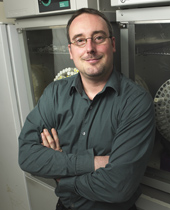Skip to content. | Skip to navigation
Personal tools

- Contact Us |
- Seminars |
- Donate

Lunenfeld-Tanenbaum Research Institute
Mount Sinai Hospital
Joseph & Wolf Lebovic Health Complex
600 University Avenue
Toronto, Ontario
M5G 1X5
Tel.: 416-586-4800 ext.6196
► Web of Science Researcher ID
F-8858-2013
Dr. Laurence Pelletier
SENIOR INVESTIGATOR
Dr. Laurence Pelletier is a Senior Investigator in the Lunenfeld-Tanenbaum's Centre for Systems Biology, where he studies molecular mechanisms in cells that regulate centrosomes and cilia biogenesis and function in human cells. A better understanding of these fundamental cellular processes has important implications for cancer and myriad other diseases.
More specifically, the Pelletier lab is fascinated with how cellular machines are built and function to regulate cell function. Such “machines”, most commonly referred to as organelles when membrane bound (e.g. mitochondria, peroxisomes and the Golgi apparatus) or non-membrane bound (e.g. the centrosome) undergo dramatic morphological and functional changes that are tightly coordinated with the cell cycle.
The laboratory’s interests range from molecular mechanisms that govern centrosome-related processes in human cells including centriole duplication to pericentriolar material assembly, ciliogenesis, cell motility and mitotic spindle assembly/disassembly. Their studies revolve around cutting-edge quantitative imaging approaches (from low- to super-resolution), high-content screening with emphasis on advanced morphometric measurements ranging from single cells to developing tissues/organoids.
The Pelletier lab remains keenly interested in the use of functional proteomics to systematically elucidate protein-protein interactions that are essential to maintain the function of these organelles. As such, we are especially interested in linking functional proteomics studies, genome-scale RNAi and CRISPR/Cas9 screens to understand, at the molecular level, how centrosome-cilia related processes can go awry in cancer and other clinically relevant disorders like microcephaly and ciliopathies and how their function ensures normal tissue homeostasis.
At a Glance
Studies molecular mechanisms in cells that regulate cell function and division.
Seeks a better understanding of how centrosome-cilia related processes go awry in cancer and other clinically relevant disorders like microcephaly.
Works with the most powerful light microscopes in the world to view proteins working in living cells.
Major Research Activities
The focus of Dr. Pelletier's lab is to understand how centrosome biogenesis and function is regulated during the cell cycle and how they template the formation of cilia and flagella in specialized cells. By organizing pericentriolar material, centrioles orchestrate bipolar mitotic spindle assembly, a prerequisite for the faithful and accurate segregation of chromosomes, failure to tightly regulate the number of centrioles in the cell leading to aneuploidy and contribution to cancer formation. Using functional genomics in combination with cutting-edge microscopy of live cells, the major goal of his laboratory is to identify and study novel proteins required for these processes and investigate their potential role in development and diseases.



